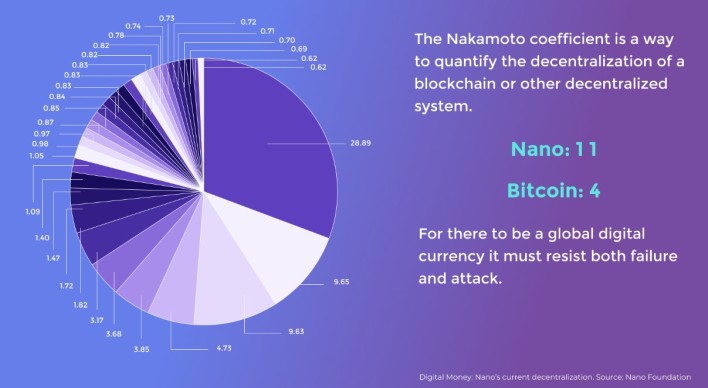
Zigurat Institute of Technology
Blog / Leadership & Transformation
Categories

Zero fees, eco-friendly and instant payment: that’s what you get when you use Nano currency. This blockchain-based Foundation was created by George Coxon, member of Zigurat’s Faculty Board in the Master of Blockchain Technologies and Director of the Nano Foundation.
We interviewed her to learn more about the Nano Foundation and its honorable goal: to provide open access to anyone in the world wanting to transfer value instantly, without fees and in an eco-friendly way.
There are five billion people in the world that do not have an address and therefore do not have access to the banking systems that I think we take for granted so easily here in the western world. What Nano fixes is this exact problem. Through Nano Currency every single person in the world can be their own bank if they have a smartphone and an internet connection. Through the Nano Foundation we are trying to democratize the global economy for everyone, in a decentralized fashion, giving the people, especially in emerging markets and emerging economies, their much needed right over their money. Nano is currently the world's most efficient digital currency with zero fees, network settlements in 0.2 seconds on average and a carbon negligible footprint.
“Nano is currently the world's most efficient digital currency with zero fees, network settlements in 0.2 seconds on average and a carbon negligible footprint”.
It's all about fixing a real world problem and not creating a solution to a problem that doesn't exist, cryptocurrency in itself was designed to bank the unbanked. I think the whole crypto space has slightly lost its way when it comes to its designed purpose and what it could achieve on a huge global scale of empowering people. We've turned cryptocurrency into this speculative wild west of a mess where utility is not at it’s forefront but greed is, however that is to be expected when global trading of assets is opened up to the world for the first time in history with very little education in trading best practices!
“Through Nano every single person in the world can be their own bank if they have a smartphone and an internet connection”
I do however believe that until a technology provides a utility that beats incumbent financial systems, whether that is with speed, cost or energy consumption, there is no real use for crypto assets to be embraced by high street banks & traditional finance other than for a purely speculative market, just more risk.
Nano is a tool to be used as and when you wish to use it. In the Western world, we are spoiled with remittance options and competitive fees and therefore Nano is a ‘nice to have’ option or choice. In emerging markets, Nano is a necessity, fixing a real world problem which is banking accessibility, extortionate fees for remittance and huge settlement delays and risk. Nano therefore, despite being a single technology, is here to be used globally in whatever way works for you - everything that money touches, Nano can do better.
I think it's very prevalent and important to say that this is just the beginning of digital money. However, all currencies are volatile. Those with large swings in supply due to monetary policy or large swings in demand due to low market cap will thus be more volatile - cryptocurrency and fiat alike. Since Nano has a fixed supply, volatility due to supply is nonexistent leaving only the need for stable demand from widespread usage.
As the utility of cryptocurrency comes to the foreground and the speculative market starts to fall away over the upcoming years, it will be very interesting to see which coins/tokens or technologies survive into the long term. We believe that utility is at the core of longevity. In the western world, we're still relying on banking and custody institutions to hold our crypto keys highlighting not only that the fundamental issue of actually using cryptocurrency is usability but that it has been designed for a western world as of late. So the question is, who is the utility for? If it is for actually banking the unbanked and making global economic change then the value proposition alters and the technology itself must reflect that.
By investing in DeFi assets like tokenized stocks, ETFs on commodities, or companies that are offered by DFX, users invest in assets that are tradable 24/7 in a permissionless way since there is no party to prohibit these trades. Of course, these assets are not real securities but rather derivatives on the underlying asset.
We view currency as a tool for all of humanity, not something to be divided into political regions. Governments’ historical role in currency predominately falls into three categories: anti-counterfeiting, monetary policy, and legal tender.
Only anti-counterfeiting is necessary for having a functional currency and while this takes effort from police and the judicial system to solve when money is paper, it is solved digitally and automatically with nano.
Monetary policy and legal tender are inherently political policies which, unfortunately, often are at odds with peoples’ desired use of currency. We think that by removing the political element from currency it will become a better economic instrument of measuring value.
There is a vast difference between a decentralized form of value transfer that is used by general global populations to governments controlling monetary policy.
A great example of a government failing in monetary policy and the knock-on effect to their own people is back in 2016 in India, the government removed two notes out of the rupee system which equated to 86% of the country's cash supply. Now, the reason being for doing this was to combat ‘corruption’ within the country. So for that to happen, they gave only 12 hours’ notice to the whole country to basically hand in these two notes if you had them and exchange them for something that would be usable. Now, who this actually affected were not those in positions of power with corruption at their core but normal people, those in lower socio-economic areas, especially rural India and especially women, women who had been married young or were trapped in abusive relationships and have no right over their own money, who had to physically and in person queue up at banks to exchange their savings (that is, if they'd even been notified of this, we're talking about rural India where there can be very little connectivity) which can be a death sentence in various cultures.
Now, this is where decentralized currency is absolutely needed. Because no one can shut it off. No one can restrict your access to your digital money as we have seen so prevalently with Covid-19 and the pandemic. By using Nano you have that right directly on your smartphone (and with an internet connection) to send, spend or save your money as you wish 24/7 365 days of the year. And linking back to the pandemic - there is a huge global money-printing problem which has only been exacerbated over the last 2 years - 40% of all US Dollars in existence were printed in the last 12 months - think about that for a second.

“By using Nano you have the right to send, spend or save your digital money as you wish, directly on your smartphone, 24/7 365 days of the year. No one can shut it off. No one can restrict your access”
However, on the other scale of governmental involvement you have El Salvador using Bitcoin as legal tender which is an unfortunate situation for multiple reasons, despite being a decentralized monetary network - Bitcoin is not fit for purpose for being a global currency (with huge settlement delays, cost and energy usage) and custodial wallets or other complicated solutions defeat the purpose of seamless digital money. The infrastructures put in place by the government currently only allow for batched transactions that are not ‘on-chain’ with the solution touted being a layer 2 solution - the lightning network - however the transactions per second limit of Bitcoin (7tps) will always remain the same.
In addition, with using the Lightning Network both sides of the transaction need to be online concurrently, without a disconnected party at the time of a transaction - that's not digital money - especially in a country that in some areas, will not have the internet access & stability we so take for granted. Despite the El Salvador government making an interesting move to utilizing a decentralized monetary network and putting power in the hands of the people per se, the knock-on effect of poor understanding of appropriate technologies for specific purposes has meant that in this specific case, the poorest merchants from that country must legally accept Bitcoin without potentially being set up to do so.


Zigurat Institute of Technology